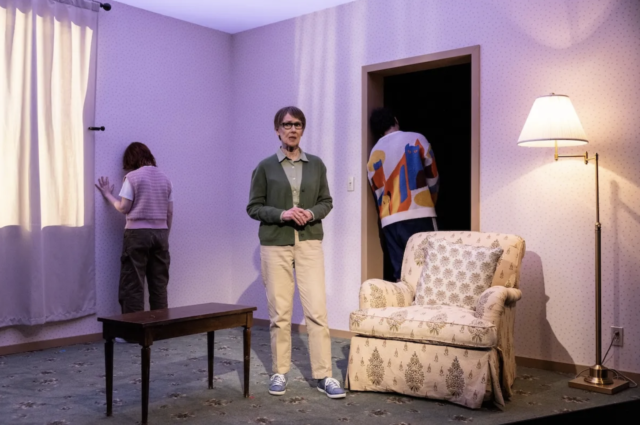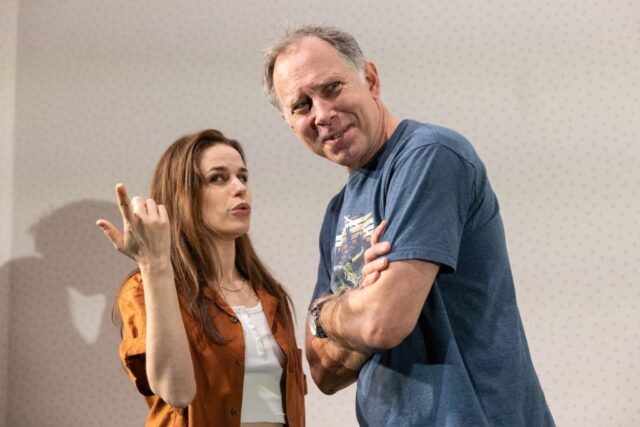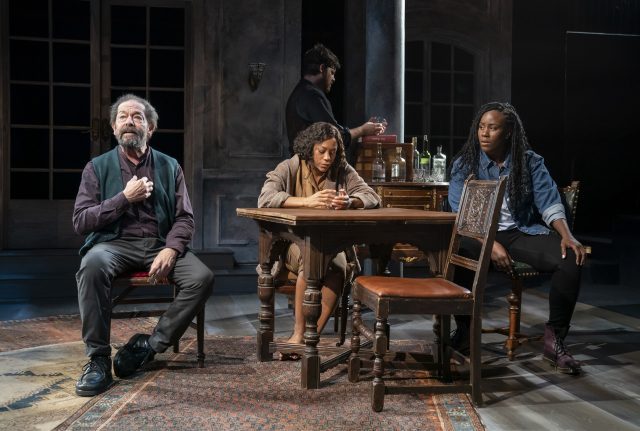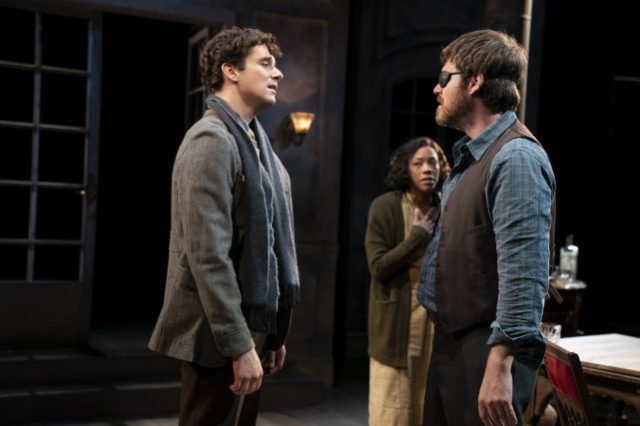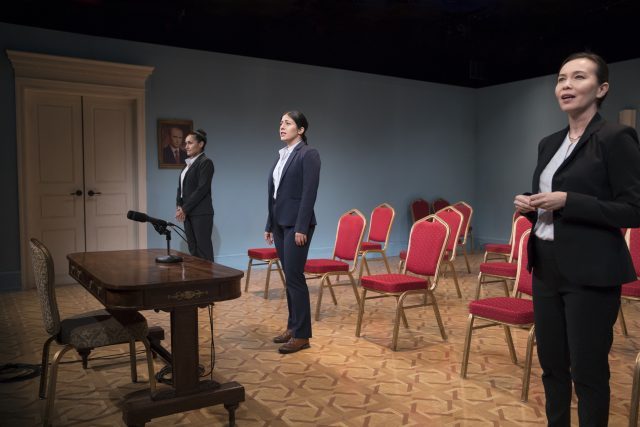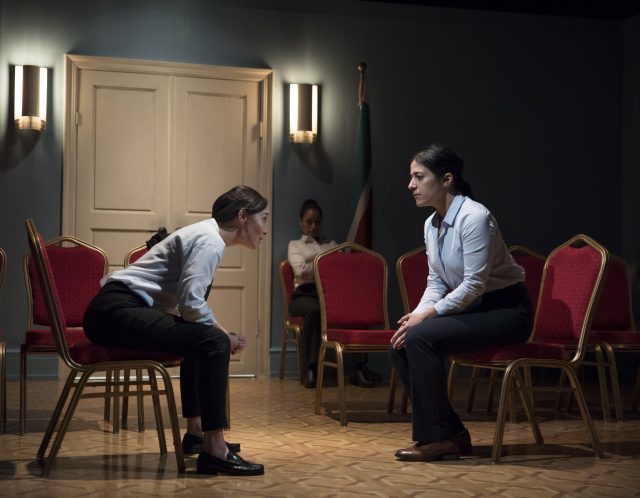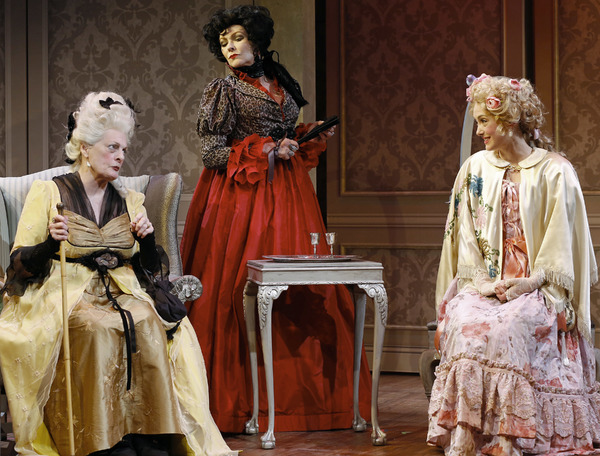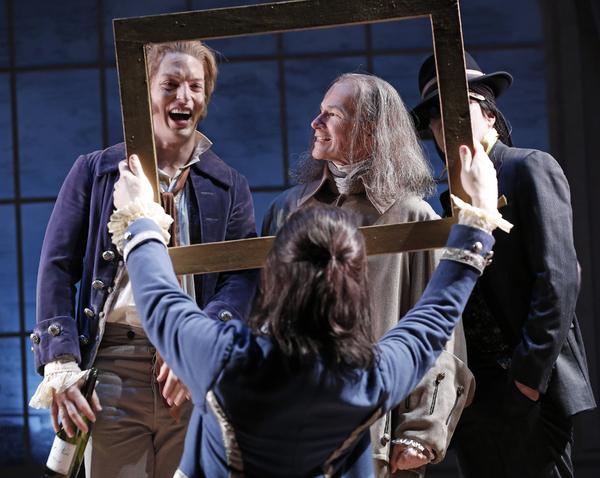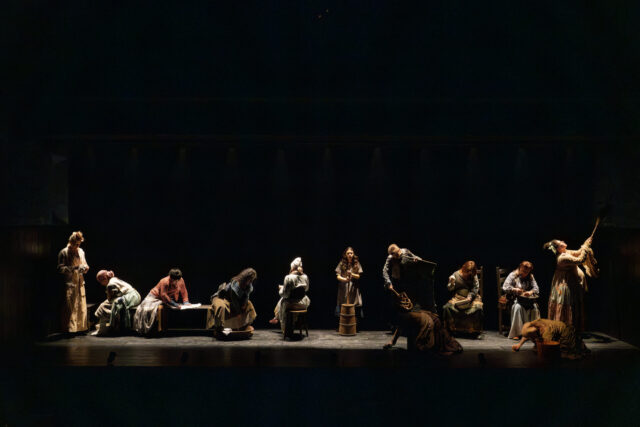
A jury of matrons must decide the fate of a convicted woman in Lucy Kirkwood’s The Welkin (photo by Ahron R. Foster)
THE WELKIN
Atlantic Theater Company
Linda Gross Theater
336 West 20th St. between Eighth & Ninth Aves.
Tuesday – Sunday through July 7, $56.50-$121.50
atlantictheater.org
Twelve Angry Men meets The Crucible by way of horrormeister Peter Straub and George Cukor’s The Women in Lucy Kirkwood’s gripping and intense, if messy and overlong, The Welkin, running at the Atlantic’s Linda Gross Theater through July 7.
Kirkwood’s previous works include Chimerica, in which a Chinese dissident and an American photojournalist attempt to find the Tank Man, who became an international symbol of resistance during the 1989 Tiananmen Square protest, and The Children, which takes place shortly after a devastating nuclear accident on the East Coast of Britain. In The Welkin, Kirkwood contemplates female autonomy — the right of a woman to control her body — directly and indirectly bringing up such issues as capital punishment, abortion, gender identity, and sexuality while celebrating individuality over groupthink stereotypes. It’s set in March 1759 on the border of Norfolk and Suffolk in England, but it relates all too closely to what is occurring in America today in the wake of the overturning of Roe v. Wade.
The play opens with a harrowing scene, cast in shadowy darkness in front of the curtain. After an absence of four months, Sally Poppy (Haley Wong) has returned home to her laborer husband, Frederick (Danny Wolohan); she is naked and bloodied, soon pulling out a hammer. We instinctively assume something awful has happened to her, but it turns out that she has apparently done something awful herself: She tells Frederick that the blood is not hers but that of Alice Wax, a young girl her lover brutally murdered and she helped dismember and stuff up a fireplace. She demands ten shillings from her cuckolded husband to pay the midwife for the baby she claims she is carrying, which she coldly says is not his. Her lack of guilt or remorse is disconcerting — as well as rife with sociocultural complications.
The curtain then rises on widowed midwife Lizzie Luke (Sandra Oh) churning butter when bailiff Billy Coombes (Glenn Fitzgerald) arrives, informing her that the judge wants Lizzie to serve on the twelve-woman jury to determine whether the convicted Sally is truly with child, in which case she cannot be hanged for her crime and would instead be transported to Australia. Lizzie shows no immediate concern about the murder. “Expect that is the closest a Wax child ever got to sweeping a chimney,” she says.
The married Mr. Coombes flirts with Lizzie — it appears that they might have an undefined thing for each other — who first refuses to participate on the jury but eventually acquiesces, leaving her daughter, Katy (MacKenzie Mercer), to churn the butter, passing female responsibilities to the next generation, who might actually want more out of life.
The jurors, each doing some kind of traditional women’s work, are sworn in one by one, sharing an aspect of their personal story before kissing “the book.” It’s a ponderous scene, but we learn that Mary Middleton (Susannah Perkins) has five children and a haunted tankard in her home. Ann Lavender (Jennifer Nikki Kidwell) is married to a poet and is raising their four daughters in “peasant honesty.” The eighty-three-year-old Sarah Smith (Dale Soules) has twenty-one children with three husbands and until recently could do a handstand for one minute. Helen Ludlow (Emily Cass McDonnell) has had twelve miscarriages in eight years. Peg Carter (Simone Recasner) is married to the third-generation gardener for the family whose child was murdered and has “this thing he is able to do with his tongue which I find very amenable.” And Charlotte Cary (Mary McCann) is a stranger in town who has a dinner engagement at five that she would prefer not to miss.
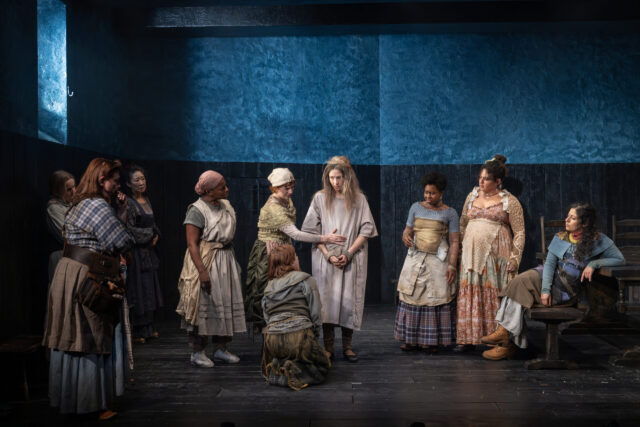
Sally Poppy (Haley Wong) must prove she is pregnant to save herself from the gallows in 1759 England (photo by Ahron R. Foster)
The rest of the two-and-a-half-hour play (with intermission) unfolds in a dungeonlike room where the dozen women have been sequestered until they reach a verdict on Sally’s supposed pregnancy. At stage left is a fireplace, serving as a constant reminder of what Sally and her lover did to Alice; at stage right is a narrow window through which a sliver of at times heavenly light peeks in. When the window is opened, the sound of the unruly mob gathered outside to await Sally’s execution comes pouring in. Sally is there to be poked and examined, her hands bound by rope. Mr. Coombes is present to “keep this jury of matrons without meat, drink, fire, and candle” and to speak only when asking if the matrons have reached a verdict.
The women take sides, chastise one another, divulge secrets, and make accusations as they debate how to determine whether Sally is pregnant. Sally does herself no favors by being nasty and difficult. “Shut up Helen what are you even doing here everyone knows you’re barren,” she barks at the intimidated Helen. Meanwhile, Sarah Hollis (Hannah Cabell) is unable to contribute much because she hasn’t spoken in twenty years, since her son was born; Kitty Givens (Tilly Botsford) and Hannah Rusted (Paige Gilbert) believe Halley’s Comet might have something to do with all the strange goings-on; Judith Brewer (Ann Harada) is a nosy gossiper; and Emma Jenkins (Nadine Malouf) is clamoring for Sally to swing.
Being a midwife, Lizzie often finds herself in the middle of it all and has a unique perspective on the matter, determined to give Sally the benefit of the doubt, explaining in a monologue that is as relevant today as it was 265 years ago: “Because she has been sentenced to hang on the word of a cuckolded husband. Because every card dealt to her today and for many years before has been an unkind one, because she has been sentenced by men pretending to be certain of things of which they are entirely ignorant, and now we sit here imitating them, trying to make an ungovernable thing governable, I do not ask you to like her. I ask you to hope for her, so that she might know she is worth hoping for. And if you cannot do that for her sake, think instead of the women who will be in this room when that comet comes round again, and how brittle they will think our spirits, how ashamed they will be, that we were given our own dominion and we made it look exactly like the one down there,” referring to the courtroom.
“Please. This whole affair is a farce. We are cold, hungry, tired, thirsty women and all of us’ve had our housework interrupted. . . . It is a poor apparatus for justice. But it is what we have. This room. The sky outside that window and our own dignity beneath it. Mary’s view is as important as Charlotte’s, and together we must speak in one voice. It is almost impossible we should make the right decision.”
A shocking event at the end of act one leads to a riveting, wildly unpredictable second act that threatens to go off the rails at any moment.
A welkin is defined as the vault of the sky, the firmament separating heaven and earth. Genesis states, “And God said, ‘Let there be lights in the vault of the sky to separate the day from the night, and let them serve as signs to mark sacred times, and days and years.’” In Act 5, Scene 5 of Shakespeare’s King John, Lewis, the dauphin, says, “The sun of heaven methought was loath to set, / But stay’d and made the western welkin blush.” Light is one of several themes underlying the play. The women are not allowed to use a candle or light the fireplace, but when Dr. Willis (Wolohan) comes to examine Sally and asks to use a candle, Mr. Coombes looks the other way.
The role of women is emphasized throughout, focusing on how they are essentially needed only for cooking, cleaning, mending, and having babies. “A woman is not a laundry list!” Lizzie declares. The only sexual pleasure mentioned in the filthy room is Mary’s enjoyment when Lizzie rubs her “down . . . there.”
The men are inept, incompetent, insensitive fools: Frederick initially wants to whip Sally; one of Mr. Coombes’s arms is in a sling and he has only one testicle, as if he has been castrated; and Dr. Willis has invented a speculumlike metal instrument to insert into Sally to examine her. When Sally says that her supposed pregnancy was not intended, that “the gentleman did not withdraw when I told him to,” Judith responds, “That’s not a method you can rely on; they’re senseless at the last post. With Mr. Brewer I always kept a piece of brick in a handkerchief under the bed; if you time your strike right you can save yourself a lot of trouble in the long run.”
Religion and truth are also on the docket as the characters argue over God’s authority. Frederick, explaining how he had to cover up Sally’s absence, admits, “At church I had to make out you’d gone to mind a sick cousin in Stowmarket. A lie, I told, in the house of God.” Later, Lizzie, discussing how twelve fetuses under her care have not survived in the past year, says, “I am the very first person they blame, God? No, they don’t blame God. Nobody blames God when there is a woman can be blamed instead.”
As the jurors continue their deliberations, Lizzie offers, “You cannot mean to ignore the truth simply cos that’s inconvenient to you.” And when Lizzie doesn’t understand why the other matrons won’t listen to her and want the male doctor to look at Sally, Sally says, “Are you dense? You have no authority here. If they must hear the truth from someone a foot taller with a deep voice, then let them.”
The always inventive director Sarah Benson, who has helmed such wide-ranging shows as Teeth, Fairview, Samara, In the Blood, and An Octoroon, throws too much at the wall in The Welkin, resulting in a choppy narrative in need of editing. In fact, at one point the women scrub the walls after the aforementioned shocking event. Now, I realize that this opinion is coming from a male member of the human species, but I hope it’s not interpreted as mansplaining.
The appropriately claustrophobic set is by dots, with splendid period costumes by Kaye Voyce, stark lighting by Stacey Derosier, creepy sound by Palmer Hefferan, and eerie special effects by Jeremy Chernick. The diverse ensemble cast is outstanding, led by Oh (Office Hour, Satellites), in a welcome return to the New York stage after eighteen years; her portrayal of Lizzie is dense and complex, instantly relatable to the modern era. Wong (Mary Gets Hers, John Proctor Is the Villain) is a force as Sally, Harada (Into the Woods, Avenue Q) offers comic relief (for a while) as Judith, Malouf (Grief Hotel, The School for Scandal) is vividly spirited as Emma, and the ever-dependable Soules (I Remember Mama, Hair) is as dependable as ever.
One of the most bizarre moments of the play occurs when the women start singing a contemporary pop song that deals with the drudgery of work and the release of sex. In the British premiere of The Welkin, it was Kate Bush’s “Running Up That Hill (A Deal with God),” but here they sing a cheerful tune that was written by a man of musical royalty but performed by an all-female group, maintaining the idea that the women are speaking out and the men are remaining quiet. There’s a lot to be said for that.
The next perihelion of Halley’s Comet is expected on July 28, 2061, so be ready.
Oh, I’ll shut up now.
[Mark Rifkin is a Brooklyn-born, Manhattan-based writer and editor; you can follow him on Substack here.]
